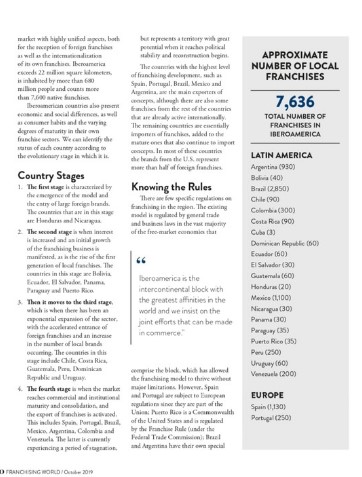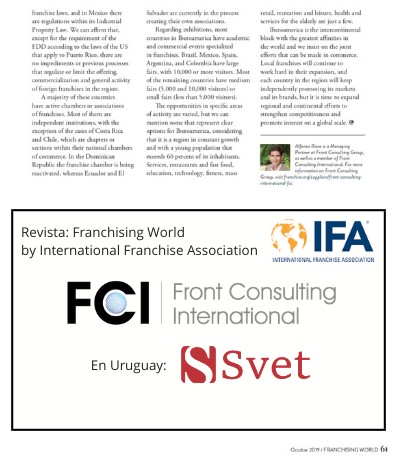La revista más prestigiosa del mundo de las franquicias, publicó un artículo de Front Consulting International la mayor red de consultores de franquicias de iberoamérica integrada por Estudio SVET en Uruguay. En su edición de Octubre 2019, la revista más prestigiosa en el sector de franquicias en el mundo, publicó un artículo sobre el mercado de franquicias en iberoamerica.
Dejamos la nota, en inglés, a continuación:
What you need to know about this prime location.
The word Iberoamerica is the combination of Iberia and America. It designates the territories comprised by the 20 Latin American countries in which Spanish and Portuguese are spoken, as well as their historical colonial homelands, Spain and Portugal, which make up the Iberian Peninsula in Europe.
Iberoamerica?
The Iberoamerican block is a tightly-knit community. It is one of the largest linguistic regions in the world and one of the most historically and culturally cohesive, which makes it a common market with highly unified aspects, both for the reception of foreign franchises as well as the internationalization of its own franchises. Iberoamerica exceeds 22 million square kilometers, is inhabited by more than 680 million people and counts more than 7,600 native franchises.
Iberoamerican countries also present economic and social differences, as well as consumer habits and the varying degrees of maturity in their own franchise sectors. We can identify the status of each country according to the evolutionary stage in which it is.
Country Stages
1 The first stage is characterized by the emergence of the model and the entry of large foreign brands. The countries that are in this stage are Honduras and Nicaragua.
2 The second stage is when interest is increased and an initial growth of the franchising business is manifested, as is the rise of the first generation of local franchises. The countries in this stage are Bolivia, Ecuador, El Salvador, Panama, Paraguay and Puerto Rico.
3 Then it moves to the third stage, which is when there has been an exponential expansion of the sector, with the accelerated entrance of foreign franchises and an increase in the number of local brands occurring. The countries in this stage include Chile, Costa Rica, Guatemala, Peru, Dominican Republic and Uruguay.
4 The fourth stage is when the market reaches commercial and institutional maturity and consolidation, and the export of franchises is activated. This includes Spain, Portugal, Brazil, Mexico, Argentina, Colombia and Venezuela. The latter is currently experiencing a period of stagnation, but represents a territory with great potential when it reaches political stability and reconstruction begins.
The countries with the highest level of franchising development, such as Spain, Portugal, Brazil, Mexico and Argentina, are the main exporters of concepts, although there are also some franchises from the rest of the countries that are already active internationally. The remaining countries are essentially importers of franchises, added to the mature ones that also continue to import concepts. In most of these countries the brands from the U.S. represent more than half of foreign franchises.
Knowing the Rules
There are few specific regulations on franchising in the region. The existing model is regulated by general trade and business laws in the vast majority of the free-market economies that comprise the block, which has allowed the franchising model to thrive without major limitations. However, Spain and Portugal are subject to European regulations since they are part of the Union; Puerto Rico is a Commonwealth of the United States and is regulated by the Franchise Rule (under the Federal Trade Commission); Brazil and Argentina have their own special franchise laws, and in Mexico there are regulations within its Industrial Property Law. We can affirm that, except for the requirement of the FDD according to the laws of the US that apply to Puerto Rico, there are no impediments or previous processes that regulate or limit the offering, commercialization and general activity of foreign franchises in the region.
A majority of these countries have active chambers or associations of franchises. Most of them are independent institutions, with the exception of the cases of Costa Rica and Chile, which are chapters or sections within their national chambers of commerce. In the Dominican Republic the franchise chamber is being reactivated, whereas Ecuador and El Salvador are currently in the process creating their own associations.
Regarding exhibitions, most countries in Iberoamerica have academic and commercial events specialized in franchises. Brazil, Mexico, Spain, Argentina, and Colombia have large fairs, with 10,000 or more visitors. Most of the remaining countries have medium fairs (5,000 and 10,000 visitors) or small fairs (less than 5,000 visitors).
The opportunities in specific areas of activity are varied, but we can mention some that represent clear options for Iberoamerica, considering that it is a region in constant growth and with a young population that exceeds 60 percent of its inhabitants. Services, restaurants and fast food, education, technology, fitness, mass retail, recreation and leisure, health and services for the elderly are just a few.
Iberoamerica is the intercontinental block with the greatest affinities in the world and we insist on the joint efforts that can be made in commerce. Local franchises will continue to work hard in their expansion, and each country in the region will keep independently promoting its markets and its brands, but it is time to expand regional and continental efforts to strengthen competitiveness and promote interest on a global scale.
Alfonso Riera is a Managing Partner at Front Consulting Group, as well as a member of Front Consulting International. For more information on Front Consulting Group, visit franchise.org/suppliers/front-consulting-international-fci.
APPROXIMATE NUMBER OF LOCAL FRANCHISES:
7,636
TOTAL NUMBER OF FRANCHISES IN IBEROAMERICA:
Argentina (930) Bolivia (40) Brazil (2,850) Chile (90) Colombia (300) Costa Rica (90) Cuba (3) Dominican Republic (60) Ecuador (60) El Salvador (30) Guatemala (60) Honduras (20) Mexico (1,100) Nicaragua (30) Panama (30) Paraguay (35) Puerto Rico (35) Peru (250) Uruguay (60) Venezuela (200) EUROPE Spain (1,130) Portugal (250)Fuente Revista Franchising World Lea también Uruguay el Hub Regional




Comentarios recientes